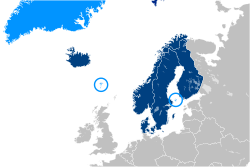Nordic council

|
|

Member states and regions of the Nordic Council (blue).
|
|
| Headquarters | |
| Largest cities | |
| Working languages | |
| Type | Intergovernmental organization |
| Membership |
8 states &
territories
|
| Leaders | |
|
|
|
|
• President
|
|
|
• Vice-President
|
|
|
• Secretary General of the Council of Ministers
|
|
|
• Presidency of the Council of Ministers
|
|
| Establishment | |
|
• Nordic Council inaugurated
|
12 Feb 1953 |
|
• Treaty of Helsinki
|
1 Jul 1962 |
|
• Nordic Council of Ministers and Secretariat inaugurated
|
Jul 1971 |
| Population | |
|
• 2012 estimate
|
25,880,000 |
| Currency | |
|
Website
www |
|
The Nordic Council is a geo-political inter-parliamentary forum for co-operation between the Nordic countries. It was formed after the Second World War in 1952 to promote co-operation between the five Nordic countries. Its first concrete result was the introduction in 1952 of a common labour market and free movement across borders without passports for the countries' citizens.
The Council consists of 87 representatives from Denmark, Finland, Iceland, Norway and Sweden as well as the autonomous areas of the Faroe Islands, Greenland and the Åland Islands. The representatives are members of parliament in their respective country/area and are elected by those parliaments. The Council holds ordinary sessions each year in October/November and usually one extra session per year with a specific theme. Since 1991 Estonia, Latvia and Lithuania participate with observer status, as well as the German state of Schleswig-Holstein since 2016.
In 1971, the Nordic Council of Ministers, an intergovernmental forum, was established to complement the Council.
During World War II, Denmark and Norway were occupied by Germany; Finland fought a costly war with the Soviet Union; while Sweden, though neutral, still felt the war's effects. Following the war, the Nordic countries pursued the idea of a Scandinavian defence union to ensure their mutual defence. However, Finland, due to its Paasikivi-Kekkonen policy of neutrality and FCMA treaty with the USSR, could not participate.
...
Wikipedia
